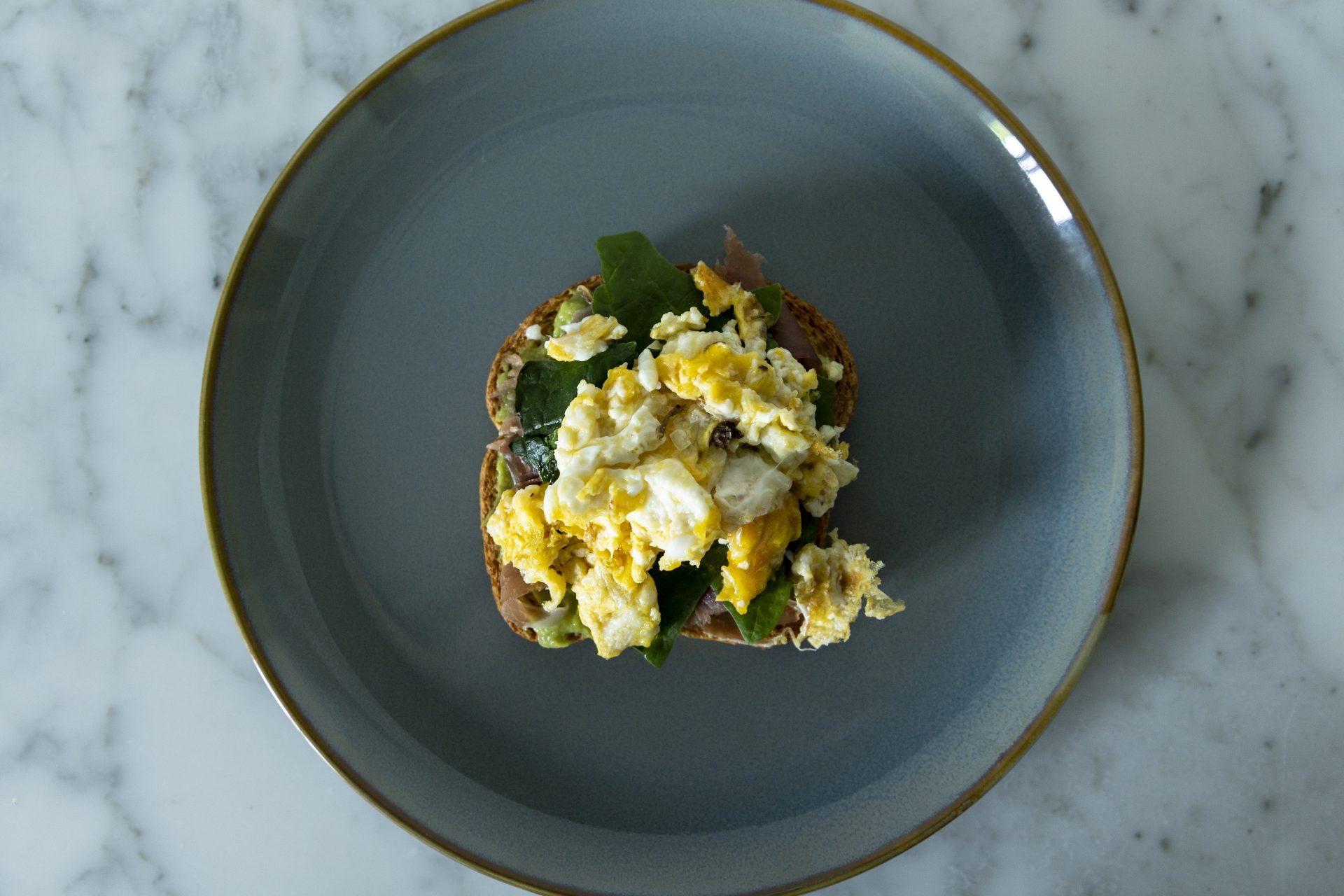Fuelling is hugely important to how well and comfortably you run. It’s not just eating the ‘right’ food that matters though; when you eat and how much of certain macronutrients you consume matters.
When you eat is arguably as important as what you chomp before, after and during a run. It’s all very well concocting the perfect bowl of overnight oats, but if you eat them 30 minutes before you lace up, the chances of those oats coming back up are pretty high. Similarly, if you leave lunch too late after a long session, you may find that you start to feel pretty sick and weak – almost as if you’re hungover.
So, what and when should you eat to run strong and recover well?
You may also like
5 pre-run breakfasts to keep you running strong
How to fuel before a run
Vicky Newbold is a SENr registered performance nutritionist who works with Championship and League One football teams, as well as endurance athletes. She points out that the general recommendation is to eat 1-4g of carbs per kilogram of body mass one to four hours before exercise.
If you weigh 65kg, for example, that means aiming to eat a minimum 65g of carbs. That could include a bowl of overnight oats (28g per cup) made with soy milk (14g per cup), half a grated apple (11g) a handful of almonds (3g), some maple syrup (13g per tbsp) and a dollop of peanut butter (3g per tbsp). All of that brings you to 72g – comfortably over the lower limit.
How much you eat and when depends, of course, on your own unique situation. Newbold tells Stylist that we have to consider practicality: “If you are running in the evening, then perhaps you’ll have a decent meal two hours before, but if you run early in the morning, you may not have the time to eat much at all.”
That’s not a big issue – particularly if you’re only planning on a pre-work 5k. For longer, more intense runs, however, fuel has to be factored in.

“Our bodies are always using a mixture of carbs and fats (and a little protein) as fuel at any one time. But carbohydrates are the body’s preferred fuel for exercise and it is definitely the optimal fuel for performance,” Newbold explains. “We can only store a limited amount of this in our liver and muscle as glycogen, with a very small amount circulating in our bloodstream, so it’s important to make sure these stores are topped up before exercise. The higher intensity or longer duration the run is, the more your body will rely on carbs for fuel.”
The body uses different macronutrients to fuel itself according to the intensity and length of the activity. When you do a low-intensity run that lasts under an hour, for example, your body uses more fats as fuel – so they’re the runs you might want to do on an empty stomach.
Newbold points out: “There is research that demonstrates additional benefits from performing these types of runs with low carbohydrate availability, to maximise the training adaptations.” But don’t try running fasted for longer: “It’s important… to fuel higher intensity runs with carbs otherwise you will risk the quality of your training and performance.
You may also like
What is fasted training and how can you try it safely?
Exercising fasted also increases the production of stress hormones, so it’s important to not do this too often,” Newbold warns. She recommends doing no more than one fasted cardio session a week and being willing to cut that down if things become more stressful in your everyday life.
“Our stress hormone levels are naturally higher in the morning; running early in the morning in a fasted state will elevate these further. Chronic stress levels can lead to a suppressed immune system and downregulation of reproductive hormones and lead to negative health consequences.”
So, fasted cardio is great but those empty-belly runs should only account for a small proportion of your exercising week. Otherwise, it’s time to carb-up. The next thing then is what kinds of foods should we be eating before a run. Newbold recommends staying away from foods high in fat, protein and fibre close to exercise as these slow down digestion – which can lead to bloating, nausea, bellyache and other gastro issues.
“Smart carbohydrates choices before a run would be porridge oats, banana, fruit salad, toast, bagels, cereal, white rice or pasta.”
How to fuel during a run
While a buttery bagel or bowl of rice might be great pre-run fuel, you want to fuel using low-glycemic-index (low-GI) carbs during your run to provide a more sustained supply of fuel. Fueling during a run can be tricky at the best of times. Medjool dates, for example, are low-GI. Just one contains 24g of carbs, so you don’t need many to refuel (which is just as well because they’re pretty high in fiber).
Many runners use gels instead of trying to eat actual food when on the move and that’s because gels tend to be easier to swallow, contain electrolytes and are high in carbs. The issue comes when you try to sup one too quickly or you swallow too many when you’re unaccustomed to them. To get the most out of gels, pick a brand and try to gradually build up your tolerance by eeking out one gel over the course of a kilometer, for example. Again, you probably don’t need to use gels if you’re running for under an hour but for half marathons and marathons, they can be incredibly useful.
How to refuel after a run
Once you’ve eaten your breakfast and managed to schlep out to do your run, the next important task is refuelling. Eating well after you’ve come back in is key to recovering well and making the most of the training adaptations you have worked hard for, Newbold explains.
The issue is, however, that often you don’t feel like eating after a really intense or long run. You know that you should eat but you’re not hungry at all. “Some research points to a suppression of ghrelin, a hormone responsible for making us feel hungry,” Newbold says by way of explanation.
“In addition to this, the redistribution of blood flow away from your gut, particularly during runs of longer duration, can make the thought of eating unappetising for many runners.” Despite that, it’s important to plan your post-run nutrition as well as you would before and during, by making smart choices.
You may also like
Post workout breakfast ideas: three high-protein, high-carb meals to eat after training
Again, that involves choosing foods that are high in carbohydrates and easily digested – limiting fat and fibre. For the first four hours post-long run, you ideally want to be eating slightly over 1g of carbs per kilogram of body mass every hour; after that, you can resume your usual eating pattern. To back to our initial example, that’d mean eating a snack containing 65g of carbs every hour. That could include one banana (27g) and four digestive biscuits (37g), for example.
Oh, and remember that rehydrating is also important; aim to replace 1.5 times that amount of fluids that you have lost in sweat (more on which here). “On longer runs, you may want to consider electrolyte drinks to replace the sodium lost in your sweat. But if you have consumed sports drinks or gels already and if you also consume food soon afterwards, you are likely to have already replaced those lost electrolytes,” Newbold confirms.
Of course, it’s not just carbs that play an important role in our fueling and recovery. Protein is hugely important post-exercise and it’s something, Newbold says, that endurance athletes often overlook because their focus is so honed on carbs.
“Your body needs protein to provide the building blocks to rebuild and repair after your run and to support the training adaptations again. Aim to consume 0.4g/kg BM in the first hour after your run.
“Also, consuming protein alongside carbohydrates has been shown to increase the restoration of the body’s carbohydrate stores. In a meal, that might be a jacket potato with a tin of tuna, some sweetcorn and broccoli. Or scrambled eggs on toast with some spinach and tomatoes.”

None of this has to be complicated. If anything, it’s proof that many of us don’t eat enough to fuel our training, and that simple foods can provide all the nutrients we need.
Newbold’s favourite recovery fodder? Chocolate milk. “Chocolate milk is a favourite recovery drink as it provides carbohydrates and protein in a 2:1 ratio and electrolytes too so it’s great for rehydration. It tastes pretty amazing too!”
If you’re dairy-free, grab a soy equivalent; other milk alternatives don’t have the same protein, carb and electrolyte content.
For more running-related content, check Strong Women out on Instagram (@StrongWomenUK).
Images: Getty
Source: Read Full Article